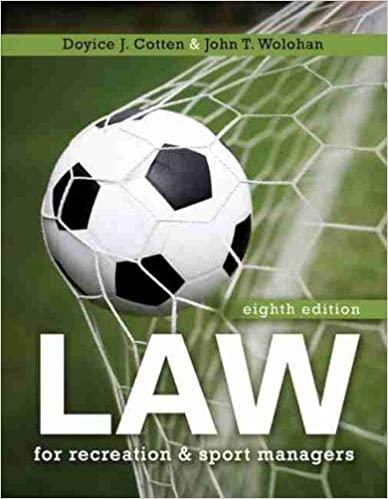Question
You are a university student in a class on the judicial system. When your professor gives out a take- home exam you are very pleased.
You are a university student in a class on the judicial system. When your professor gives out a take- home exam you are very pleased. But, then, you discover that she will be basing your entire final exam grade (16% of your final grade) on only two questions and on only three choices. Naturally, you are outraged. The process seems entirely unfair and arbitrary and is a clear demonstration of uncheckedprofessorial power. Obviously, you'll want to litigate. You try to get some of your classmates to join withyou, but they tell youthey're too busy. Similarly, when you contact the ACLU (your civil liberties, after all, have been violated) and the U.S. Chamber of Commerce (your performance on this test has real implications for your future employment and thus your ability to be a good American consumer) you are told that they are too strapped even to write you an amicus brief. Moreover, you have learned that the University is fully backing the professor on this issue and, in addition to its own counsel, has retained Baltimore super-lawyer Peter Angelos. On the plus side, though, since "you have a phone, you have a lawyer," and your new attorney informs you that you should proceed with this case on federalconstitutional due process and equal protection grounds. Unfortunately for you a jury decides against you at trial and the 4thCircuit Court of Appeals upholds the trial court decision. Of course, you now proclaim your intention to take your case all the way to the Supreme Court. What are the chances of your case being heard by the Supreme Court?To answer this question, you can and should draw on our discussion of interest groups in courts, as well as more recent discussions and readings onSupreme Court procedure. You may also want to be thinking about "haves" and "have-nots."
Can someone help me elaborate on what else to say for what I wrote at the bottom? I am stuck on what else to say.
The US Supreme Court receives 10,000 cases a year but a smaller percentage of it get to be heard primarily because of the hierarchy of powers distributed per court level. If issues branch out and can be heard by the federal courts, the Supreme Court acknowledges the jurisdiction of the lower and appellate courts. If I were to be asked, this is a case about equal protection and due process which all courts are governed. There is a change or possibility that the Supreme Court will get to hear this case with powerful and convincing arguments in the Petition for Certiorari.
The one who will bring this up to the Supreme Court shall have observed fully these considerations. In order to successfully hurdle the entire panoply of clerks or Supreme Court Lawyers assigned per Justice who will get to review the Petition for Certiorari and be issued a Writ of Certiorari, you should have stated the paramount legal effect of filing this case in the first place. Will this be beneficial to the country? To all students who will have faced the same case in the future. In short, know the importance of your case on a national level. Look for Conflict of Law. The issue on equal protection and due process are essential to all trial procedures in any court level. As a petitioner who would want a successful hearing will have to know any conflict of law that only the High court can resolve. Again, if your petition will contain federal issues that can be retorted by circuit courts, the Supreme Court will automatically refer the case to the lower courts.Know the areas of law that each Justice favors or their specialization. We have to do a thorough research on each of them individually and the issues which were commonly brought to them for decision. By that way, you can ascertain what to state in your petition. Avoid placing arguments that will remarkably affect the momentum of Justices choosing your case to be heard. Know the fundamental issues that are of great importance even to the Justices as highly educated people with glamorous profession.The review will be made by the group of lawyers per Justice and you have to think of great arguments which most likely affect and help them bring your case on the table of the Supreme Court Justices.
Step by Step Solution
There are 3 Steps involved in it
Step: 1

Get Instant Access to Expert-Tailored Solutions
See step-by-step solutions with expert insights and AI powered tools for academic success
Step: 2

Step: 3

Ace Your Homework with AI
Get the answers you need in no time with our AI-driven, step-by-step assistance
Get Started


